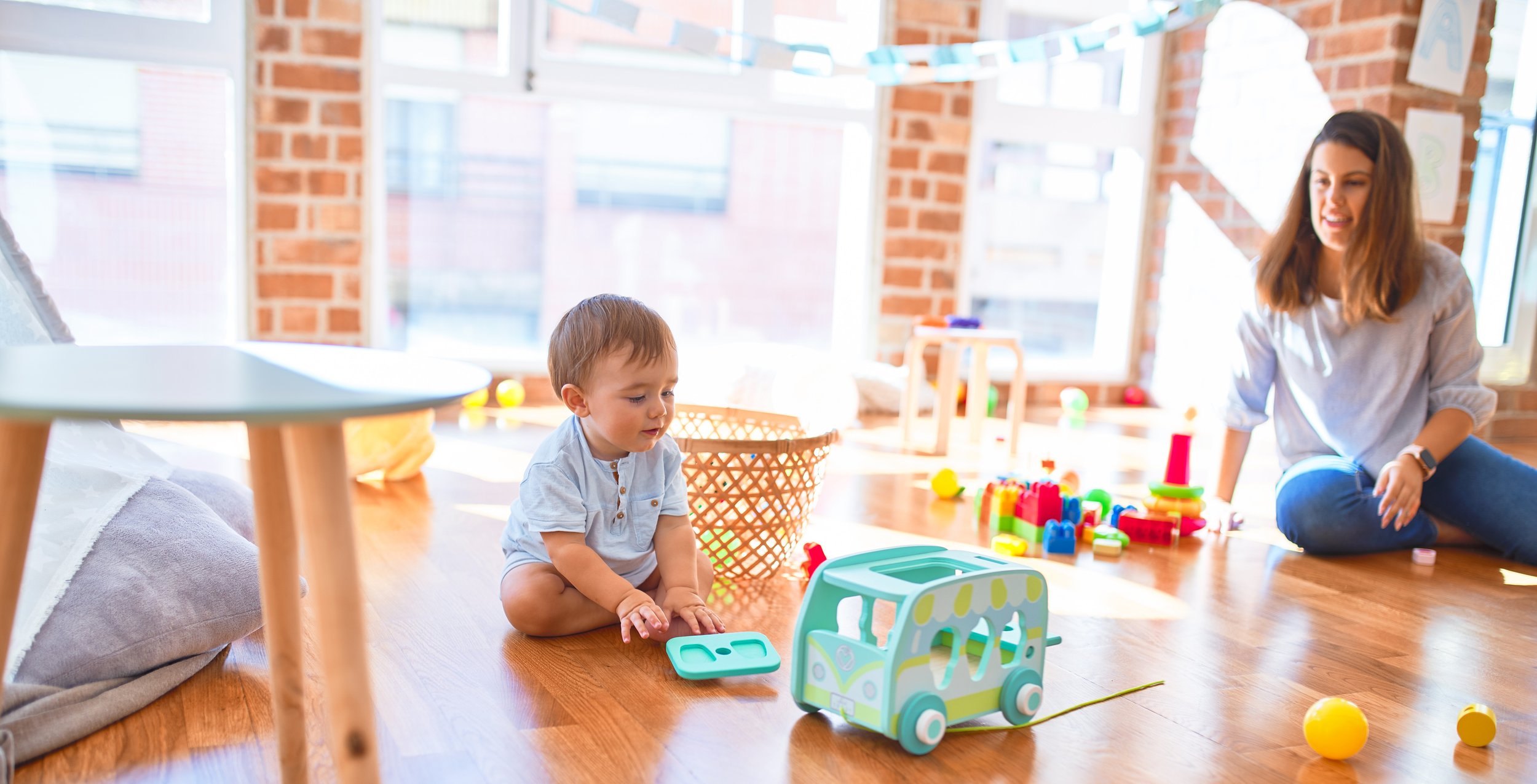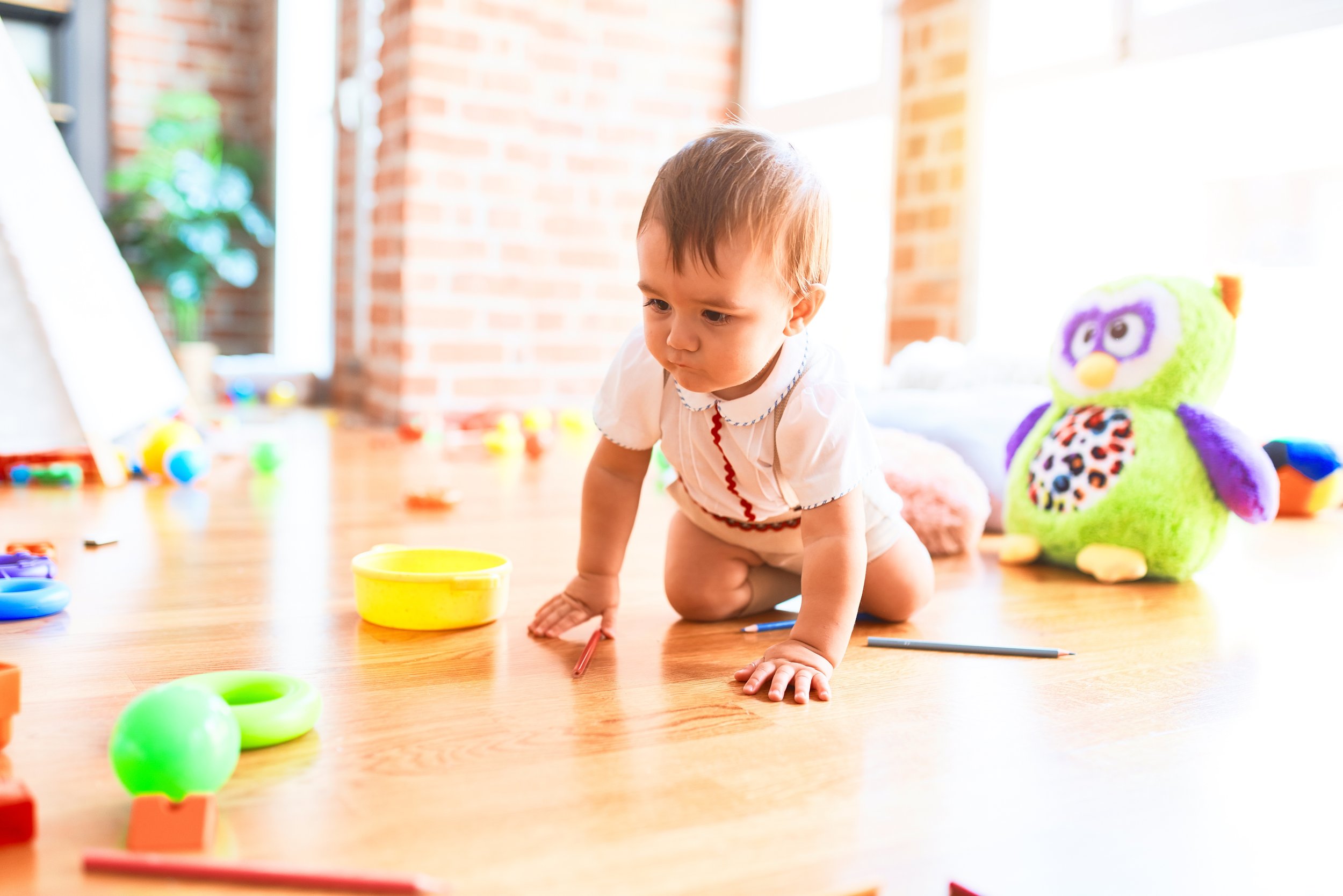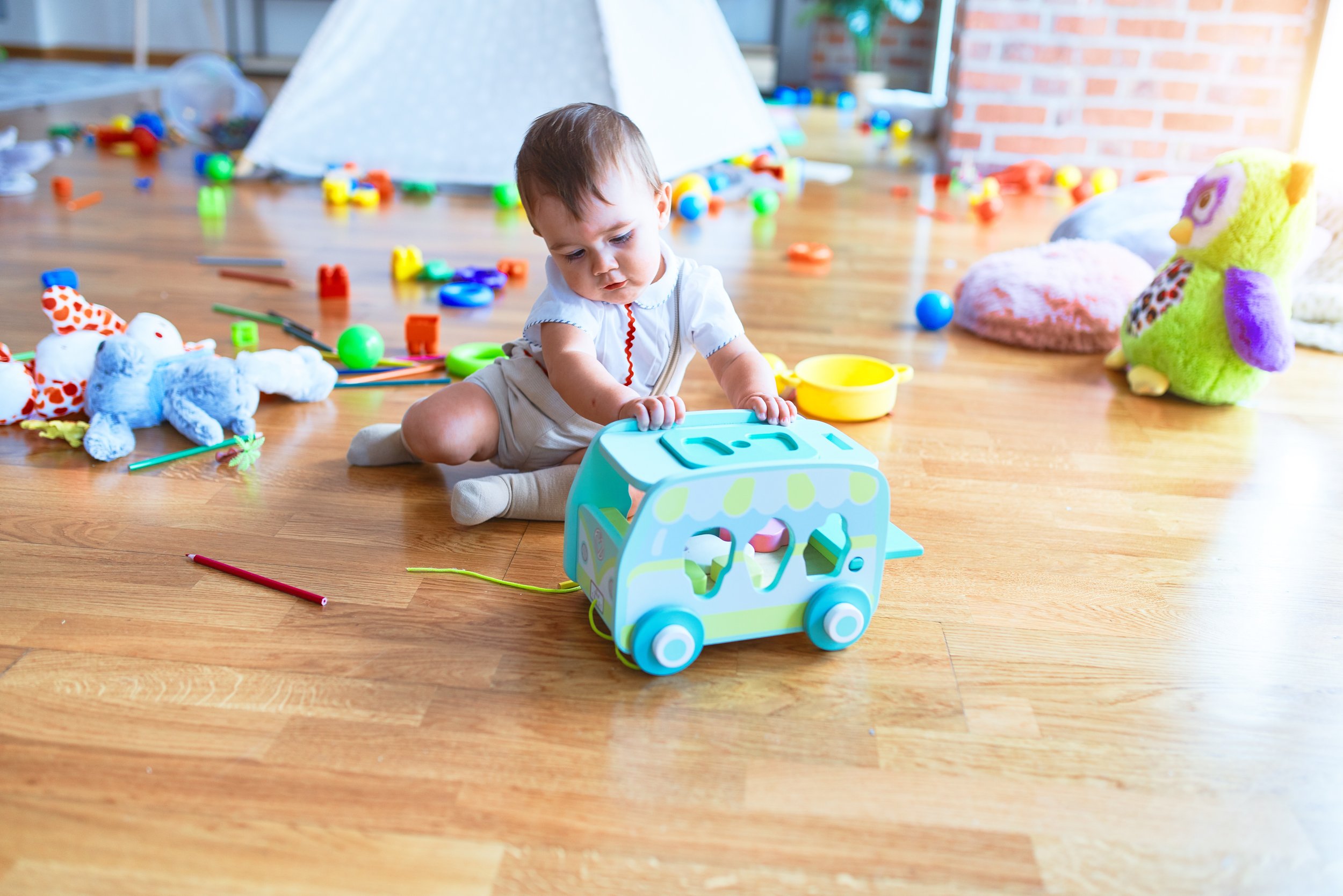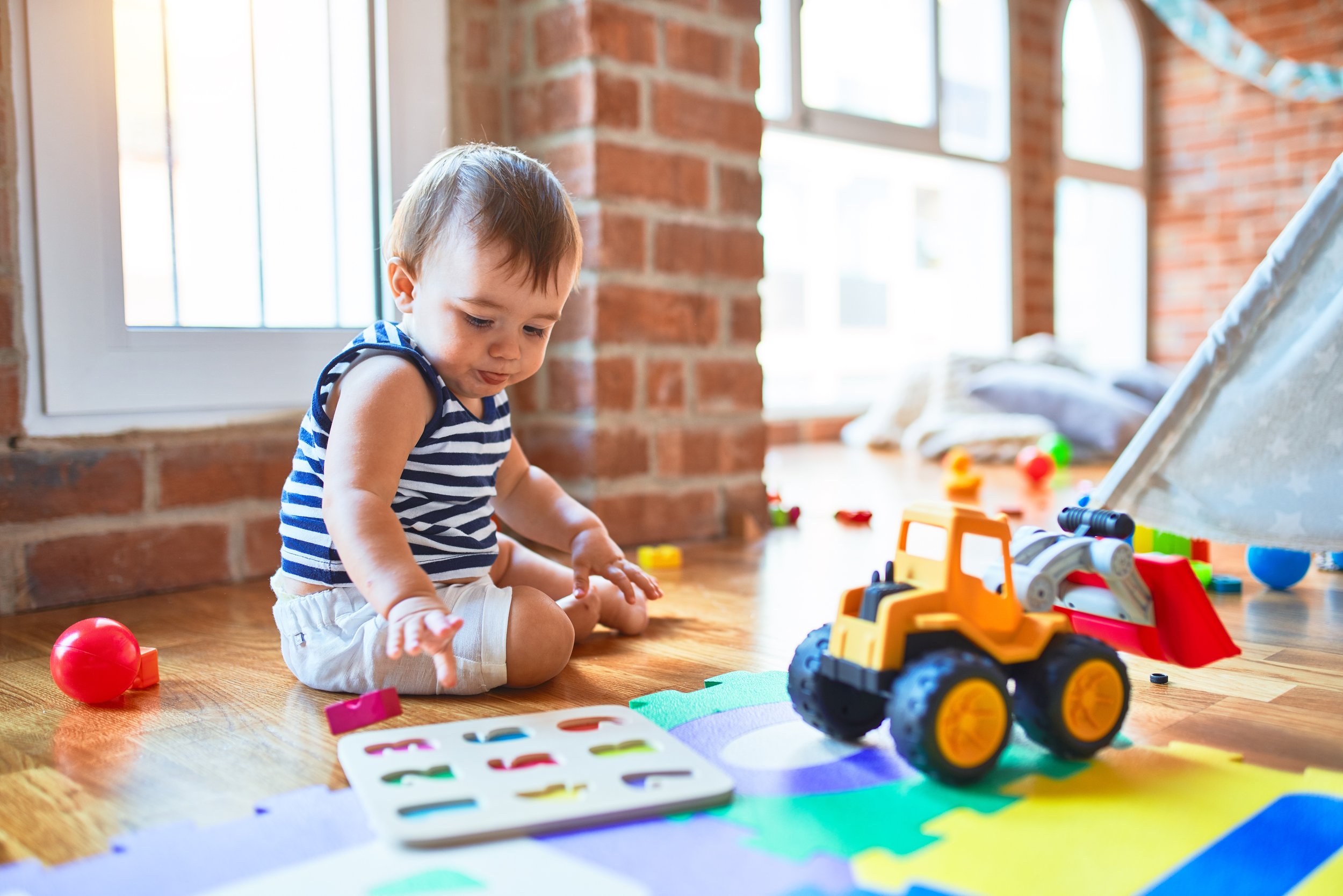Baby First Words List
Learn the most common first words and how to help your baby reach this exciting milestone!
Hearing your baby say their first word is one of the most anticipated moments for parents! You’ve been listening to their babbling for months, deciphering their gibberish, and trying to listen for a word.
With all the sounds your baby is making, it can be really hard to know if they actually said a word or if they are just doing their normal jibber-jabber.
First, I want to give you the 3 foolproof ways to distinguish your baby’s first word from their babbling. Then, I will share a baby first words list of the 15 most common words babies say first and why so many babies have the same first words.
Listening for your baby’s first words
It happens all of a sudden! Your baby says their first word without warning and it may take you by surprise!
Let’s quickly paint the scene in our minds. Your baby is sitting in their high chair after breakfast and the dog is licking spilt oatmeal off their legs, and your child says says “dah!”, you may be wondering, Did you just say your first word? Is “dog” your first word?!
Well, the answer is, maybe.
There is no official first words speech therapy rule to define, but there are some common criteria we use to distinguish a first word(s) from your baby’s babbling and gibberish. Used together, you can feel confident that you heard your baby say their first word.
How to know if your baby said their first word
They said the same thing to mean something specific
They said it on their own without having to directly copy someone
They said the word 3 times or more
So in our story, when your baby said “dah!” out of the blue (without hearing someone say “dog” first) and is looking at your sweet dog who is tickling their toes as they lick off the spilt oatmeal, it is possible they are saying dog. But we can’t be entirely sure it’s the first word yet, because you’ve heard them babble “dah-dah-dah” throughout the day for other things too.
Now you’re on high alert listening for them to say dog (“dah”) again. Later that morning, you take the dog out to go potty. He lifts his leg and starts peeing on the bush. This excites your baby who notices the action, points, and says “Dah!” again to let you know the dog is going potty. Then again at night when you feed the dog his dinner, your baby excitedly says “Dah!” as he watches his puppy enjoy his dinner.
Because you’ve been listening closely, you know “Dah!” is different from the ongoing “dah-dah-dah-dah-dah” babble that you overhear as your baby plays on the floor with their favorite toys. You also noticed that your baby didn’t say “Dah!” on it’s own to refer to anything else, just the dog. AND they said it three times!
It’s official! Your child has said their first word!
A baby’s first words may sound very similar
Sometimes early words might sound like each other. That’s because babies and toddlers are still learning and practicing, so their speech doesn’t sound great yet. For example, “dah” might apply to other words that sort of sound the same, like “Dada.” That’s okay. It takes some time before their talking starts to sound better. All new skills take practice!
Now that you know how to decipher your baby’s first word, let’s talk about some of the most common first words! Then keep reading to learn how to help your baby reach this exciting milestone.
BABY FIRST WORDS LIST:
15 of the most common first words
Mama
Dada
Papa
Ball (may be pronounced “ba”)
Bye
Uh-oh
Hi
No
Dog (may be pronounced “dah”)
Bottle (may be pronounced “bah” or “bah-bah”)
Baby
Woof woof
Banana (may be pronounced “nana”)
Bubble (may be pronounced “buh-buh)
Milk
When there are SO many English words, why do so many babies have the same first word?
There are two major factors that cause so many babies to have the same first word.
The first has to do with how often these words are repeated or how many times your baby hears a word. They are more likely to say a word that they’ve heard someone else say hundreds of times over. All the words on this list are things your baby has probably heard daily, and the same is true for other babies as well!
Second, most of these words contain the consonant sounds “m” “p” and “b.” These are also consonant sounds you’ve probably heard while your baby is babbling. They are the most common first consonant sounds because your baby can easily see how you are moving your lips open and close to make these sounds. Try making the “P” sound and then try making the “K” sound. You’ll notice that for “p” your lips come together and then apart; you’re baby can see this happening! When you make the “k” sound your tongue is moving in the back of your mouth; your baby can’t see this. When it comes to learning to talk, it’s easier for babies to copy what they can easily observe. And it’s easier for them to pronounce words that contain these sounds versus others.
Now, how to encourage your baby to say their first word
There are a few tried and tested first words speech therapy strategies when it comes to encouraging your baby to say their first word. Keep in mind, these strategies won’t make your child say their first word, we are just stacking the odds in their favor. As hard as it is, now is the time to be patient and observant!
Here are 4 first words speech therapy strategies you can use:
Pick a few specific words and repeat them often
Make sure your child can see your face so they can imitate you
Make more comment and ask less questions
Keep your child’s attention by following their lead in play
You can learn my 4 favorite speech therapy strategies for encouraging first words with my free mini-course linked here: The Foundations Of Speech Course For Parents
The course includes 4 three-ish minute videos where I will explain the strategies above and show you how to use them. Plus you will get an activity guide for each strategy to make everything as easy as can be!
Parents Also Asked:
What words should a baby say at 1?
There is no particular word or words a baby should say a 1. Most children will say their first word between the ages of 10 months and 14 months. At 12 months it doesn’t matter what word a baby says (any word they are interested in saying is great) and it’s possible they haven’t said their first word yet.
Keep in mind that words baby say a 1 may not sound the same as words that we say. That’s because their pronunciation skills are still developing; the important thing is that your baby’s word sounds the same every time they say it.
When should the first words be spoken?
Babies say their first words between the ages of 10 to 14 months.
What are some first words?
Some of the most common first words around the world include: Mama, Dada, and Papa.
These words all follow the same pattern - (consonant + vowel) repeated. This pattern of combining sounds into words is often the first that babies learn, which is why many of the most common first words sound very similar.
You May Also Like:
Written By: Stephanie Keffer, MS CCC-SLP
© 2020-2025. Stephanie Keffer Hatleli, MS CCC-SLP. All Rights Reserved.
The content offered on ToddlerTalk.com is for informational purposes only. Toddler Talk is not engaged in rendering professional advice, whether medical or otherwise, to individual users or their children or families. No content on this site, regardless of date, should ever be used as a substitute for direct medical advice from your doctor, speech language pathologist, or other health professional. By accessing the content on ToddlerTalk.com, you acknowledge and agree that you are accepting the responsibility for your child’s health and well-being. In return for providing you with information related to home speech and language practice, you waive any claims that you or your child may have as a result of utilizing the content on ToddlerTalk.com.







